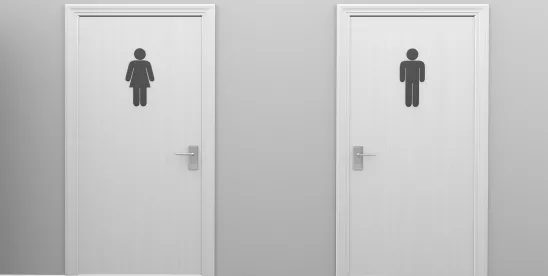Takeaways
- A federal court in Texas vacated the gender identity portions of the EEOC’s harassment guidance.
- Uncertainty remains about issues like sex-designated restrooms and personal pronouns, but employers should continue to require employees to treat everyone with respect.
- Employers also should consider carefully all accommodation requests and always engage in the interactive process.
Related links
- Enforcement Guidance on Harassment in the Workplace
- Texas v. Equal Employment Opportunity Comm’n (opinion)
- Bostock v. Clayton County (opinion)
- Oncale v. Sundowner Offshore Servs., Inc. (opinion)
- Defending Women from Gender Ideology Extremism and Restoring Biological Truth to the Federal Government (executive order)
- U.S. Supreme Court to Hear Arguments on LGBTQ+ Workplace Protections under Title VII
Article
A federal district court in Texas on May 15, 2025, vacated gender identity parts of the 2024 Equal Employment Opportunity Commission (EEOC) Enforcement Guidance on Harassment in the Workplace (the EEOC Guidance). The court ruled that the EEOC exceeded its statutory authority by expanding the definition of sex under Title VII “beyond the biological binary.” Texas v. Equal Employment Opportunity Comm’n, No. 2:24-CV-173 (N.D. Tex.).
2024 EEOC Guidance
Issued in April 2024, the EEOC Guidance defined “sex” under Title VII of the Civil Rights Act to include sexual orientation and gender identity. The EEOC Guidance further provided that “repeated and intentional use of a name or pronoun inconsistent with the individual’s known gender identity (misgendering)” or “denial of access to a bathroom or other sex-segregated facility consistent with the individual’s gender identity” could be considered a form of sexual harassment.
Texas v. EEOC Decision
The court concluded that the EEOC Guidance “contravenes Title VII’s plain text by expanding the scope of ‘sex’ beyond the biological binary.” The court noted that when the U.S. Supreme Court in Bostock v. Clayton County, 590 U.S. 644 (2020), decided that discrimination on the basis of homosexual or transgender status can constitute sex discrimination under Title VII, it assumed, without deciding, that sex in Title VII refers “only to biological distinctions between male and female.”
The court further determined that the EEOC Guidance “contravenes Title VII by defining discriminatory harassment to include failure to accommodate a transgender employee’s bathroom, pronoun, and dress preferences.” For support, the court cited the Supreme Court’s decision in Oncale v. Sundowner Offshore Servs., Inc., 523 U.S. 75 (1998), and stated:
[C]ourts have long recognized that Title VII “does not reach genuine but innocuous differences in the ways men and women routinely interact with members of the same, and the opposite, sex.” Nor does Title VII require “asexuality” or “androgyny” in the workplace. In sum, Title VII does not bar workplace employment policies that protect the inherent differences between men and women.
The court interpreted Bostock narrowly, as determining only that firing someone based on homosexuality or transgender status violated Title VII’s prohibition on sex discrimination, because “discrimination based on homosexuality or transgender status necessarily entails discrimination based on [biological] sex.”
The Supreme Court expressly stated in Bostock that its decision did not address “bathrooms, locker rooms, or anything else of the kind.”
Noting that Congress could amend Title VII explicitly to include gender identity in the definition of sex, the court concluded:
Title VII does not require employers or courts to blind themselves to the biological differences between men and women. Nor does it mandate that employers obliterate neutral employment policies rooted in this recognition. Thus, the Enforcement Guidance contravenes Title VII by expanding the definition of “sex” beyond the biological binary and requiring employers to accommodate an employee’s dress, bathroom, or pronoun requests.
Executive Order
The court’s decision aligns with President Donald Trump’s Jan. 21, 2025, executive order, “Defending Women from Gender Ideology Extremism and Restoring Biological Truth to the Federal Government” (Two Sexes EO), which states that it is the “policy of the United States to recognize two sexes, male and female.” The Two Sexes EO directed federal agencies to act to ensure intimate spaces are designated for single-sex use based on biological sex, and not by gender identity. It also directed the EEOC to rescind the EEOC Guidance. The EEOC has not yet rescinded the guidance because, with only two commissioners, it lacks a quorum. Since the Texas v. EEOC ruling, however, the EEOC has noted on its website the parts of the guidance that have been vacated. The EEOC is not expected to appeal the court’s decision.
Takeaways for Employers
- While employers who discriminate based on sexual orientation or gender identity may still be liable under Title VII and the Supreme Court’s Bostock decision, uncertainty remains as to whether employers can or should limit access to bathrooms and locker rooms based on biological sex and whether employers must accommodate an employee’s personal pronouns.
- Even absent the EEOC Guidance, courts may still conclude name-calling or repeated intentional misgendering could constitute unlawful harassment. As always, and as with most matters, employers can and should continue to require employees to treat everyone — regardless of their sex, sexual orientation, gender identity, religious belief, or any other classification — with respect.
- Employers also should consider applicable state and local laws.
- Twenty-four states and the District of Columbia prohibit employment discrimination on the basis of an individual’s gender identity.
- Seven states and the District of Columbia mandate access to sex-segregated spaces that align with an individual’s gender identity.
- Two states have made it a crime for an individual to knowingly enter a sex-designated changing room that does not align with the individual’s sex assigned at birth.
- On May 19, 2025, Colorado Governor Jared Polis signed the “Kelly Loving Act,” which adds to the state’s antidiscrimination laws provisions related to using a person’s correct name and pronouns, regardless of gender identity. (The same day, a lawsuit was filed challenging this law under First Amendment and Fourteenth Amendment grounds.)
- Employers are likely to continue to see increased requests for religious accommodation relating to policies or training on pronoun or restroom use. They also are likely to face an increase in requests by employees to use sex-designated spaces that align with gender identity fashioned as accommodation requests under the Americans with Disabilities Act. Some courts have found gender dysphoria to qualify as a disability.
- As with any accommodation requests, employers should carefully consider the requests and engage in the interactive process to determine if a reasonable accommodation is possible without posing an undue hardship.






 />i
/>i
